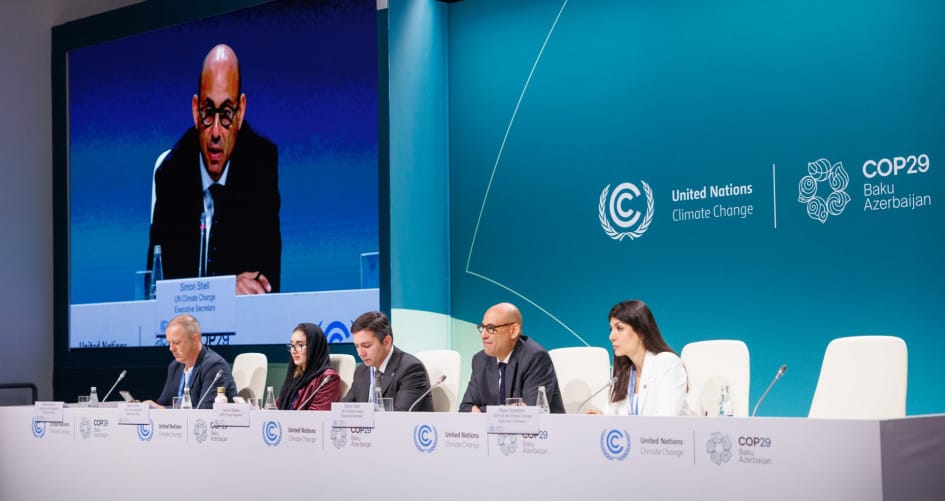More than 50,000 delegates are in Baku, Azerbaijan for the second-most attended COP in history, behind only COP28 in Dubai last year. In this week's brief, we explore announcements coming from COP29, including a new deal for UN rules to govern carbon markets, commitments by development banks to scale climate finance, and bold emissions targets by the UK. While the progress is notable, a tracker from Carbon Brief highlights that nearly half of the major agenda items still lack draft text, there is still significant ground to cover to secure a major deal on climate finance, and major leaders, including the former head of the United Nations and the former head of UN Climate, are calling for reforms to the COP process.
Follow Tectonic on Instagram and LinkedIn for regular updates about the innovators and innovations moving climate ambition into action.
Carbon trading deal secured at COP29: A global carbon trading deal was agreed to at COP29 with the goal of launching multibillion-dollar carbon markets governed by UN emissions rules. The deal aims to help raise funds for developing countries to adapt to climate change and accelerate emission reductions by bigger polluters. The International Emissions Trading Association estimated the UN-backed market could generate $250 billion annually and cut 5 gigatons of carbon annually by 2030.
Development banks commit to scaling climate finance: The world's largest multilateral development banks (MDBs) pledged at COP29 to raise $120 billion in climate finance annually for developing nations by 2030, a significant increase from the $75 billion raised in 2023 and $60.9 billion in 2022. The MDB group, which includes the World Bank, the European Investment Bank, and the Inter-American Development Bank, among others, says their capacity to scale up climate finance further depends on the commitment of their country shareholders to contribute more capital. World Bank President Ajay Banga emphasized that MDBs cannot source the trillions of dollars needed but can facilitate private sector investment by streamlining guarantee provisions, taking a first loss in certain projects, and rolling out local currency financing.
The UK announces significant climate targets: At COP29, UK Prime Minister Keir Starmer announced ambitious climate targets, aiming to reduce greenhouse gas emissions in the UK by 81% by 2035 compared to 1990 levels. This target is the most ambitious of any industrial economy, positioning the UK as a destination for clean energy investment. To achieve this goal, the UK needs to double its wind power on land, expand solar capacity threefold, and construct new power lines, with an estimated $80 billion in investments required.
Former leaders outline reforms for COP: A group of former leaders and climate experts called for reforms of COP. The letter, signed by more than 20 experts, including former UNFCCC head Christiana Figueres and former U.N. Secretary-General Ban Ki-moon, emphasizes that the COP process has achieved significant progress but now needs a fundamental overhaul to deliver the necessary change at an exponential speed and scale. The letter calls for a shift from negotiation to implementation, enabling the COP to deliver on agreed commitments and ensure the urgent energy transition and phase-out of fossil fuels.
Global emissions increase: Global carbon dioxide emissions from fossil fuels are projected to reach a record 37.4 gigatons in 2024, a 0.8 percent increase over 2023 levels, according to the Global Carbon Project. The increase in emissions is not uniform across the globe, with declines expected in the United States and Europe, and a slowdown in fossil fuel use in China, but offset by a surge in carbon dioxide emissions from India and the rest of the world. India's fossil fuel emissions are expected to increase by 4.6 percent, the largest single driver of the growth in carbon dioxide globally. The European Union's emissions are expected to decline by roughly 3.8 percent. The United States' carbon dioxide emissions are expected to drop modestly this year, by around 0.6 percent, due to the retirement of older coal-burning power plants and a shift towards natural gas. A relatively small number of countries account for most of the world's emissions, with China responsible for 32 percent, the United States for 13 percent, India for 8 percent, and the European Union for 6 percent.
Explore ways we can work together.
The US announces plan to triple nuclear power by 2050: The Biden Administration unveiled a plan to triple the country's nuclear power capacity by 2050, aiming to deploy an additional 200 gigawatts of nuclear energy capacity through new reactors, plant restarts, and upgrades to existing facilities. The short-term goal is to have 35 gigawatts of new capacity operating within the next decade, with the administration addressing issues such as a lack of skilled labor, domestic fuel supply, and regulatory infrastructure that have hindered nuclear development in the past.
A fee on methane emissions: The Biden Administration announced a first-ever methane fee on large energy companies emitting excess methane, a potent greenhouse gas. The fee, which is part of the 2022 Inflation Reduction Act, will be imposed by the EPA and will charge large energy producers $900 for every ton of methane emissions that exceed levels set by the federal government, starting in 2024. The fee will increase to $1,200 in 2025 and plateau in 2026 at $1,500 per ton and will apply to oil and gas facilities that report methane emissions of more than 25,000 metric tons of carbon dioxide equivalent per year.
New York City adopts congestion pricing: New York is set to become the first city in the United States to adopt a congestion fee on polluting cars and trucks entering the most heavily trafficked city blocks, joining many other cities around the world with similar levies designed to reduce traffic and air pollution. The city will implement a fee of $9 to enter parts of Manhattan, lower than the previously proposed $15, to reduce traffic and pollution and generate revenue to improve public transit. Many cities worldwide have implemented congestion fees, including Singapore, Oslo, Stockholm, Milan, Amsterdam, and London, with some fees in place for decades.
NYC pension fund joins climate group: The New York City Employees' Retirement System, a pension fund managing approximately $89 billion in assets, has joined the Net-Zero Asset Owner Alliance (NZAOA), a climate-finance group aiming to address investment risks from global warming. NYCERS' decision comes after the pension fund proposed ending fossil-fuel investments in private markets last month and pledged in 2021 to cut emissions by 2040. Members of the NZAOA, including the California Public Employees' Retirement System and Allianz SE, set intermediate decarbonization targets every five years. The group reported in September that its members cut portfolio emissions at a rate aligning with the Paris Agreement's goal of limiting global warming to 1.5C.
China initiates massive offshore solar power project: China has initiated power generation from its first gigawatt-level offshore solar project in the eastern province of Shandong. The massive open-sea photovoltaic plant, situated approximately 8 kilometers off the coast of Dongying city, has a total installed capacity of 1 gigawatt. Several provinces and cities, including Shandong, Jiangsu, and Shanghai, have planned offshore solar capacity to help land-constrained areas develop renewable energy sources. Shandong province, an industrial hub south of Beijing, aims to add more than 11 gigawatts of offshore solar capacity by 2025, with an ultimate goal of building 42 gigawatts of capacity.
European Investment Bank seeks to commit €500 million for climate tech: The European Investment Bank (EIB) plans to unveil a €500 million counter-guarantee program to support clean-tech companies in Europe, enabling them to compete with global rivals. The EIB's initiative aims to boost Europe's clean-tech sector, which faces competition from the US, where companies benefit from the Inflation Reduction Act, and China, which provides state support to its companies. This move is part of the EIB's efforts to double down on support for the region's clean-tech firms, following a €5 billion pledge of counter-guarantees to the struggling wind sector last year.
Learn more about Tectonic's creative agency.
Ivory Coast establishes green-financing facility: The Ivory Coast is establishing a $500 million green-financing facility to support efforts to combat climate change and reduce greenhouse gas emissions by one-third by 2030. The facility is backed by the African Development Bank and the Climate Investment Funds. The blended-finance facility will seek to raise capital from various sources, including the Green Climate Fund, the Global Environment Facility, multilateral development banks, development finance institutions, and other sources. The new facility is part of the African Development Bank's African Green Bank initiative, which seeks to increase African nations' share of global finance dedicated to climate-resilient and low-carbon projects from 3% to 10% by 2030.
Financial Times launches emission tracker: The Financial Times launched a new iteration of its searchable dashboard of 193 countries' historical emissions and future climate targets. The dashboard includes each country's overall missions and energy mix and uses data from Climate Watch, the International Energy Agency, and the UN's NDC data registry.
Volkswagen and Rivian deepen partnership on EVs: Volkswagen and Rivian have formed a joint venture to develop software and electronics for electric vehicles. Volkswagen invested $5.8 billion in Rivian and took a 50% stake in the new company. The partnership will initially focus on developing software for electric vehicles but may be expanded to include battery modules or other technology. Volkswagen will use the technology developed by the joint venture in various types of vehicles, including subcompacts and cars made by its Audi and Porsche divisions.
Carbon capture startup raises $32 million: US startup Vaulted Deep has raised $32 million in venture capital funding to expand its operations of injecting carbon waste underground using oil industry technology. The company collects organic waste such as biosolids and livestock manure, and injects it about a mile deep into wells, with existing plants in Los Angeles and Kansas, and a new site planned in Colorado. Vaulted Deep's process is considered fast and relatively simple compared to other carbon removal technologies, and the company also gets paid for waste disposal. The injection wells can handle vast amounts of waste with technology similar to fracking, and the company has already delivered over 5,000 tons of carbon dioxide removal. The funding round was led by Matt Eggers of Prelude Ventures, and included Lowercarbon Capital and several other investors.
German platform for regenerative farming raises $22 million: Berlin-based agritech startup Klim, founded in 2020, has secured a $22 million Series A funding round led by BNP Paribas to expand its regenerative farming platform internationally. Klim's platform provides farmers with tools to plan, execute, and finance the transition to regenerative practices, including data on restoring soil health, biodiversity, capturing carbon, and reducing emissions. The platform also allows farmers to track the progress of their transition and prove it to supply chain partners, enabling them to earn revenue payouts for sequestered carbon. Klim takes a commission on the sale of carbon "insets" linked to supply chains, and farmers can generate revenue from these by selling them on Klim's marketplace.


